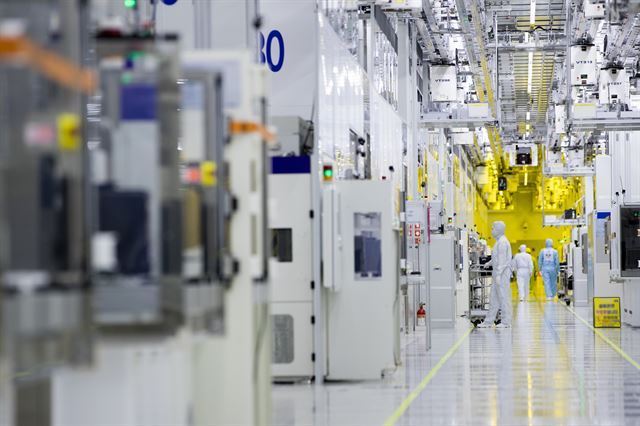 |
Chipmaker Samsung Electronics’ semiconductor factory in Hwaseong City, Gyeonggi Province. (Samsung Electronics) |
Finance Minister Hong Nam-ki said Wednesday that three sectors for electronic materials, parts and equipment, which have been affected by trade restrictions of Japan since last year, are back on a stable track as a result of governmental support.
“We have come with specified measures on the voluntary investment worth 2 trillion won ($1.72 billion) by the private sector here and additional investment plans by global companies,” said Finance Minister Hong at a meeting in Incheon.
“(The government) will complete the process of stabilizing the supply of the three key components this year, and other 100 electronic parts and materials gradually from 2021 to 2025,” the minister said.
Investment plans to galvanize the sectors include Hyosung Group’s 1 trillion won to add new facilities at its carbon fiber manufacturing complex in Jeonju, North Jeolla Province, by 2028 and car parts company Hyundai Mobis’ 300 billion won scheme to roll out non-fossil fuel vehicles from 2021. The plans also include chip wafer manufacturer SK Siltron’s acquisition of US chemical giant DuPont’s wafer business unit and the establishment of a joint venture between car manufacturer Hyundai Motor Group and US automotive components maker Aptiv Technology.
Global chip companies, including MEMC, Lam Research and DuPont, are also planning to set up research labs and manufacturing bases in Korea.
The minister said that the government will make all-out efforts to reduce its technological dependency on Japan, the world’s electronics components powerhouse, in segments for crucial components and materials.
In July last year, the Japanese government removed Korea from its list of trusted trading partner countries, toughening regulations for the export of three types of key components in manufacturing chips and displays: photoresists, hydrogen fluoride and fluorine polyimide.
The trade curbs came after the Korean Supreme Court’s ruling that ordered some Japanese firms to compensate Korean victims of forced labor during Japan’s 1910-45 colonial rule of the Korean Peninsula.
Since the tougher trade rules went into effect, the Korean government has been on high alert, announcing support plans for local companies in the electronics sectors. It has earmarked 116.5 billion won to support R&D projects to locally produce 25 key electronic components for this year.
By Kim Young-won (
wone0102@heraldcorp.com)








